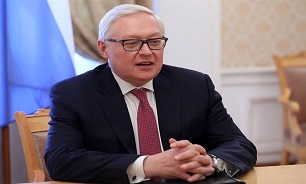Russian Diplomat Voices Support for Iran’s Missile Program
 European countries should realize that Iran’s missile program is not a threat but is only a part of Tehran’s measures to ensure its national security, Ryabkov told reporters in Iran’s embassy in Moscow at a Monday ceremony in honor of the 40th anniversary of victory of the Islamic Revolution.
European countries should realize that Iran’s missile program is not a threat but is only a part of Tehran’s measures to ensure its national security, Ryabkov told reporters in Iran’s embassy in Moscow at a Monday ceremony in honor of the 40th anniversary of victory of the Islamic Revolution.
Development of missile program is Iran’s inalienable right to defend itself and the West’s push to halt Iran’s missile program is only an attempt to weaken Iran and mount fresh pressure on it, the Russian deputy minister added.
Ryabkov also expressed confidence that Iran will press ahead with its plans to safeguard its national interests despite such hostile attempts.
He further criticized the European Union for its "dual approaches" to Iran.
“The EU must rise above its dual approaches when they try not to annoy the Americans, and to do something so that Iran sees real efforts, and to make the right choice by deciding in favor of real cooperation,” Xinhua quoted Ryabkov as saying.
He said the EU and a number of its members have applied sanctions to Iran against the rules of international law and the UN Security Council resolutions.
The demands of European countries to reduce or close the Iranian missile program resulted from their "desire to please the Americans," he said.
Russia finds it unacceptable and will explain the "fallacy and harmfulness" of such a course at a meeting of the Joint Commission of the Joint Comprehensive Plan of Action (JCPOA) in March, he added.
Referring to the EU steps to create conditions for normal economic cooperation with Iran, including the INSTEX mechanism, Ryabkov said, “Our position, if described briefly and concisely, can be reduced to a phrase that something is better than nothing.”
On the other hand, the creators of this mechanism could not ensure its opening for third countries, first of all, for Russia and others who are interested in legal cooperation with Iran, he added.
Ryabkov finally underlined that Russia will seek full-fledged participation in the activities of the mechanism and continue relevant efforts in direct contacts with the countries concerned.
The three EU signatories to the 2015 Iran nuclear deal (France, Germany and Britain) have set up INSTEX (Instrument in Support of Trade Exchanges) to help continue trade with Tehran and bypass the US sanctions.
INSTEX will be based in Paris and be managed by a German banking expert. Britain will head the supervisory board.
The European countries are reportedly going to use the channel initially only to sell food, medicine and medical devices in Iran.
In May 2018, the US president pulled his country out of the JCPOA, the nuclear deal that was achieved in Vienna in 2015 after years of negotiations among Iran and the Group 5+1 (Russia, China, the US, Britain, France and Germany).
Message end/
